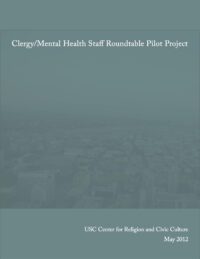Individuals deal with various levels of trauma, including loss and bereavement, sickness and health, and mental illness—such as depression and schizophrenia—and even the chaos of everyday life and family disturbances. For many people in Los Angeles County, houses of worship are the first places they turn to for counseling, advice, support and a listening ear. While many clergy have accepted this role as part of their dedication to their faith and community, many lack the training, support, and infrastructure to provide effective services to people in need and to make appropriate referrals outside their congregational walls when necessary.
On the other hand, mental health providers and social workers within Los Angeles County do not always understand the nuances of particular communities where clients reside. Clinical staff have unique knowledge and training to assist those in the recovery process, but they can overlook—or lack access to—an additional toolkit that may speak to people diagnosed with mental illness: the spiritual language. Spirituality and religion in tandem with mental health care can be part of a healing process that treats the whole individual. Efforts to connect the mental health and clergy disciplines are needed. Such efforts can create the opportunity for mental health providers to gain greater access to communities in efforts to support consumers and family members of loved ones diagnosed with mental illness, while religious leaders can gain access to a network of mental health resources to support their work in this realm.
Based on the model of the successful Rabbi/Social Worker Roundtable created by Jewish Family Service of Los Angeles, the Los Angeles County Department of Mental Health (DMH) has established the Clergy/Mental Health Staff Roundtable Pilot Project. The Clergy/Mental Health Staff Roundtable is a pilot program of the DMH focused on enhancing relationships between these two groups in order to more adequately equip clergy in their pastoral counseling and consultation, while also exposing mental health staff (MH staff) to the role that spiritual resources can have in counseling. The pilot project was created with the specific aim of incorporating spirituality into the recovery process of individuals diagnosed with mental illness. In order to do so effectively, one of the central goals of the project is to promote collaboration and mutual-learning partnerships between clergy and faith-based organizations and mental health professionals and the public mental health system.
In general, clergy and MH staff have worked independently to meet the needs of individuals and their families suffering with mental illness. The Roundtables were intended to be a first step toward building bridges between these two care-taking groups in order to improve treatment, expand the resource base, and better assist the communities served. While there were previous efforts to work with faith communities in the county’s service provision areas, most notably the faith-based mental health consortium organized by SPA 6 District Chief Yolanda Washington, DMH had not previously created a formal structure and process to foster and support these types of collaborations. Initially, DMH selected two SPAs (SPA 6 & 7) in which to pilot the project, with the hope that what was learned from this phase could be institutionalized across all county SPAs.
The Center for Religion and Civic Culture (CRCC) at the University of Southern California provided consulting services to document the process and learnings of the Roundtable pilot, identifying the strengths and successes, as well as the areas that may not have succeeded as well, with the goal of improving the program and perhaps expand it. CRCC gathered information on the pilot program process through a series of in-person and telephone interviews with the program consultant, the Roundtable facilitators, clergy, and MH staff—including parent and peer advocates—who participated in the monthly Roundtables. Each Roundtable participant received an invitation to participate in these interview. A total of seventeen participants agreed to the interview process, nine from SPA 6 and eight from SPA 7.
Our objective for the interviews was to gather information in the following areas:
- Participant background and professional training
- Motivating factors for participation in the Roundtable
- Perceived benefits of the Roundtable
- Understanding how the group interacted with each other and whether rapport was generated through their interaction
- Information about topics discussed
- Ways in which collaboration and referrals are occurring as a result of the Roundtables, and finally
- Any suggestions and feedback from participants about the overall Roundtable experience.
This report concludes with a list of possible strategies for enhancing the success, impact and effectiveness of the Roundtable program.[1]
[1] In order to maintain the anonymity of the Roundtable participants, we have adopted a style that does not include identifying those interviewed beyond their status as either MH staff or clergy.
